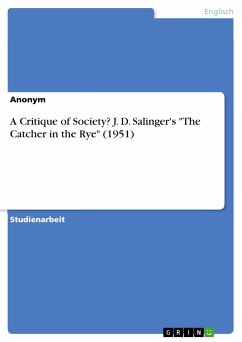Studienarbeit aus dem Jahr 2010 im Fachbereich Amerikanistik - Literatur, Friedrich-Schiller-Universität Jena, Sprache: Deutsch, Abstract: Ever since the publication of J.D. Salinger’s novel The Catcher in the Rye in 1951, there were controversial discussions and numerous debates about the story of sixteen-year-old Holden Caulfield. Even so the book is often considered as a classic in literature, it can still be found among the list of banned books in many American classrooms, libraries or bookstores. Due to its usage of vulgar and offensive language, as well as the illustration of a rebellious teenage character, who indulges underage drinking, smoking, and promiscuity; the novel was often considered as too pessimistic and too obscene for young Americans on their way from adolescence to adulthood (qtd. in Lomazoff). Others, on the contrary, argue that Holden’s rebellious behavior against the American society of the 1950’s exactly represents an entire generation of American youngsters, which was later defined as the ―Beat Generation‖. Although the book already celebrated its fiftieth birthday in 2001, the story of Holden Caulfield still enjoys great popularity among youngsters all over the world. Up to this date, youths are still identifying themselves with the sixteen-year-old protagonist. Holden’s rebellion against the ―phony‖ adults, as he describes them throughout the novel, his first experiences with love, his strive for freedom and his struggle of finding an identity and a place in society, are mainly the key features adolescents can relate to. Unfortunately, the press and numerous critics cannot share the fascination of many youngsters. Down to the present day, most critics are rather interested in Holden’s mental state and his ―misbehaving‖ in society, than in trying to understand the impact that he had and still has on youngsters. Most essays and articles that had been released about the protagonist’s characteristics deal with the analysis of his mental ―illness‖, his depression and nervous breakdown. Indeed, many analysts and newspaper journalists assign reasons for Holden’s behavior by arguing that he acts and behaves in such a rebellious way, because he’s just in the throes of the puzzling process of growing up. As if this was not enough, they also refer to him as an ―unregenerate whiner‖, being ―as phony as those he criticize[s]‖ (Yardley para. 2). [...]
Bitte wählen Sie Ihr Anliegen aus.
Rechnungen
Retourenschein anfordern
Bestellstatus
Storno









